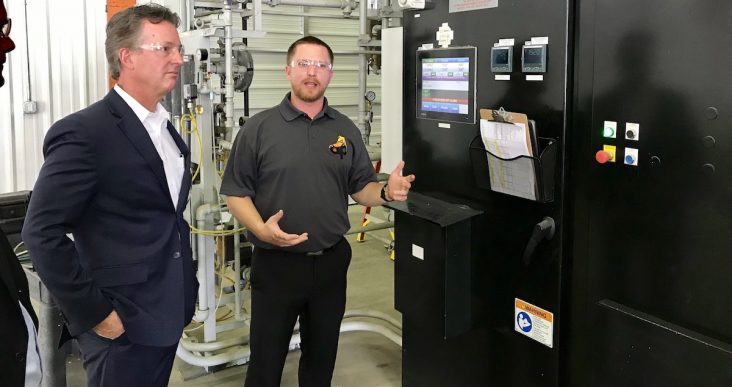Applied Process opens for business in Fort Smith
by August 22, 2018 5:58 pm 2,013 views

(from left) Tim Allen, president and CEO of the Fort Smith Regional Chamber of Commerce, listens as Applied Process Plant Manager Rusty Rainbolt explains the function of a piece of equipment in the plant.
On Wednesday (Aug. 22), Livonia, Mich.-based Applied Process opened its doors to the public to celebrate the beginning of operations in Fort Smith. The company purchased and renovated an abandoned building at 5400 North 6th Street for $2.751 million starting in January.
The overall expansion has been between $8 million and $10 million, counting the addition of industrial equipment. The location was once a spice warehouse for OK Foods. For Tim Allen, president and CEO of the Fort Smith Regional Chamber of Commerce, the process started “about a year ago.”
Allen said the Chamber competed heavily with Northwest Arkansas and Oklahoma for the company but ultimately won out, in part, due to the city’s workforce.
Plant manager Rusty Rainbolt confirmed as much to Talk Business & Politics, crediting his team for “great integrity and work ethic,” qualities Applied Process will be targeting for future hires. Rainbolt said the company teaches new employees “everything you need to know to come in,” adding that “we start at $13 an hour, have great benefits, and the company really gives back to their employees.”
According to the company’s recruiting brochure, the average entry-level production wage is $31,500 and the company pays up to 95% of health insurance premiums. After adding in another $3,600 in average entry-level bonus and profit sharing, the total compensation comes out to about $49,600, or roughly $23.85 per hour for new hires with no experience.
Allen said it felt good to hear someone else praise the city’s workforce.
“It’s no surprise to me, but it’s always good to hear other companies bragging about our workforce. I say it all the time, but these guys are validating that. So this is a nice new win for Fort Smith.”
Allen called the facility “a great example of a clean manufacturing operation,” noting the future of manufacturing “simply does not take as many people to do the job.”
He continued: “However, the wages of these jobs are 20-25% higher than the manufacturing jobs of yesteryear. And if you go out to the floor — the automation — you can see it. The programming and the skill sets are totally different than what you’ve seen in other manufacturing companies. So, this company is making a substantial investment — or has made the investment already — of $8-$10 million in Fort Smith. And they’re going to hire 25 people, maybe up to 50,” Allen said.
Rainbolt confirmed the expansion hopes. He told Talk Business & Politics the facility had 20 employees when it officially opened last month, that it hopes to add “another 5-6 soon, and over the next five years, we’re going to grow that number up to about 50.”
“We started as a half-size facility with three furnaces, and we’ll grow out to six,” he added. The current plant size is about 51,000 square feet.
Applied Process specializes in austempering heat treatment processing. It has “a diverse industry base,” Rainbolt explained. “We work in everything from automotive to aerospace to mining and construction and agriculture. Big customers of ours would be Ford Motor Company, Fiat Chrysler, John Deere, Caterpillar, all the way to railroad companies. It spans the market.”
The types of products it churns out include “everything from roof anchors that hold up mines and bridges to lawnmower blades and everything in between.”
Rainbolt continued: “Our big thing is that we’re a lean manufacturer, a state-of-the-art manufacturer. We help with a lot of lightweighting,” a term for the building of cars and trucks that are less heavy as a way to achieve better fuel efficiency and handling. “We also help with product life expansion so people don’t have to replace things as often. We’re a green facility. We’re also a zero-output facility, so none of the process water or anything used in our process goes down the drain or out the door. It’s all reused, replanted, and put back into the process.”
